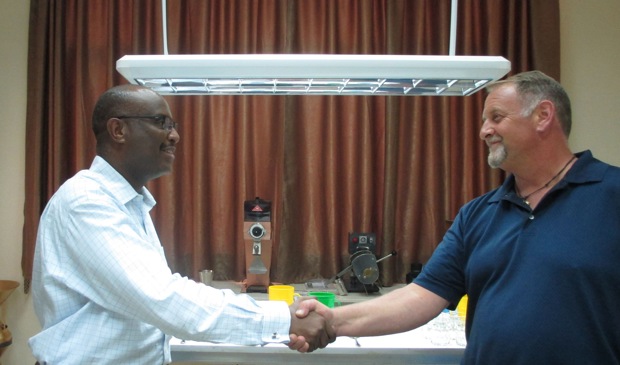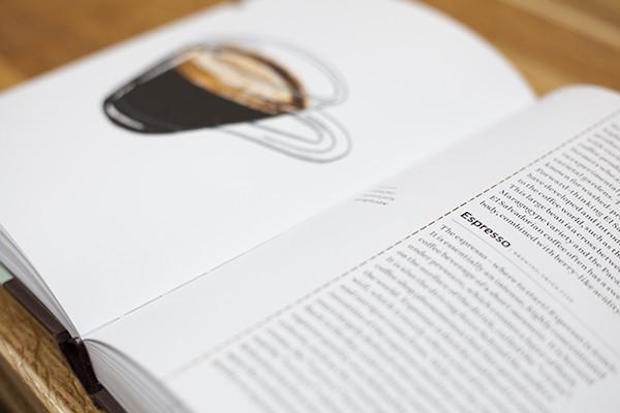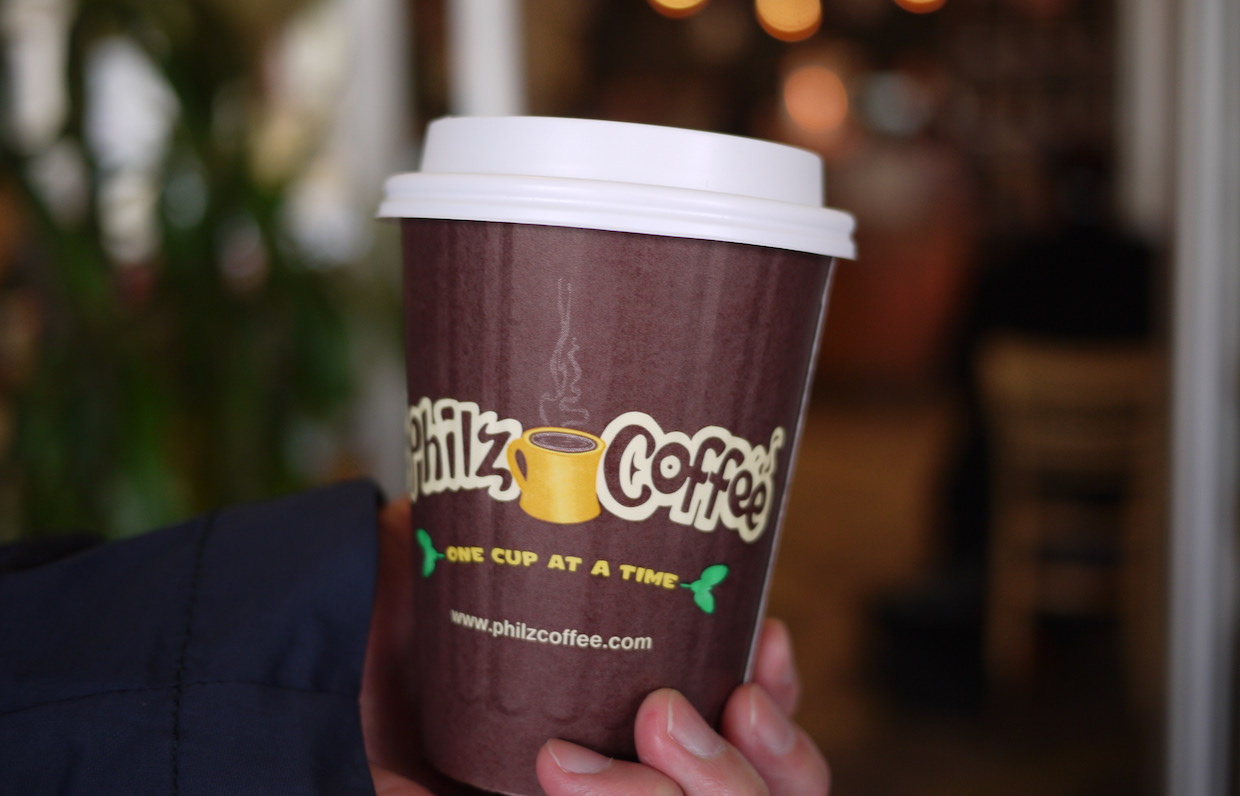
Skip Finley (right) in Addis Ababa, Ethiopia, in 2013 visiting the METAD Coffee Quality Control Laboratory. Photo courtesy of METAD.
The specialty coffee world last week lost one of its most respected ambassadors in Skip Finley. Professionals throughout the coffee world took to social media to share their memories and sincere thanks for the gifts Skip brought to them throughout his remarkable life, and Barista Magazine and the SCA’s Ric Rhinehart shared particularly heartfelt tributes to the man and his career. From Rhinehart:
For the staff of the SCA the world contains a little bit less light today, because today Skip Finley has physically left us. As we mourn Skip throughout the coffee world, we also have a chance to remember his spirit, which remains very much with us. In an organization that was founded on, and thrives on, the energy and commitment of its volunteers, Skip was an exceptionally generous, gracious, and committed example of volunteer leadership.
Multiple-time UK Barista Champion and Colonna Coffee founder and namesake Maxwell Colonna-Dashwood is releasing a coffee dictionary on Sept. 7. From Colonna:
Maxwell’s new book is an A to Z of terms, concepts and stories inspired by coffee’s journey from seed to cup, with over 80 beautiful illustrations from artist Tom Jay.
Pre-order now and receive a signed copy from Maxwell, accompanied by 5 limited edition postcards of select images from the book.
The conversation about coffee shops as harbingers of gentrification will continue so long as fancy coffee shops keep moving into traditionally low-income neighborhoods. It’s a complex issue that has for the most part been regrettably ignored by the specialty coffee community in the public sphere, yet it’s happening today, and it will happen again tomorrow.
The Pacific Standard has published a remarkable piece that gives this conversation some historical context, beginning with the birth of coffee itself. Here’s one of the most interesting passages that draws obvious parallels to today:
A small coffee shop renaissance in the United States in the 1950s and ’60s parallels their spread in Boyle Heights and Crown Heights today: Like several third-wave institutions, many of these cafés took root in immigrant neighborhoods. Teenagers flush with disposable cash and leisure time flocked to Italian immigrant neighborhoods like New York’s Greenwich Village, San Francisco’s North Beach, and Boston’s North End to try out espresso drinks—then a novelty—and hang out with countercultural artists, writers, and musicians.
In a partnership of two Oregon specialty companies gone big, Rogue Ales & Spirits has announced the nationwide canned release of its Cold Brew IPA, featuring cold brew provided by Stumptown Coffee Roasters
, which is owned by Peet’s Coffee, which is owned by JAB Holding Company. And, you can do your “favorite things” with it!:
“We turned two of our favorite things into one and then canned it so we can take it with us when we do our favorite things,” said Rogue President Brett Joyce.
Cold-brewed for over 12 hours and then double filtered for a silky taste, Stumptown’s Cold Brew Coffee is blended with an IPA that Rogue specially crafted to accentuate two favorite flavors.
A casual analysis from Food & Wine suggests that Amazon’s recent acquisition of Whole Foods has propelled popular coffee brands such as Starbucks, Keurig and San Francisco Bay into some of the company’s top-selling products, while elevating coffee on the whole in the battle for e-commerce shelf space:
In the wake of its recent acquisition of Whole Foods, Amazon is already profiting — literally. The retailer’s grocery sales increased by 50 percent in the weeks around its purchase announcement. And now, a new analysis shows Amazon’s sales are up in another way: the online grocery retailer is selling loads of popular coffee products.
What this all means for traditional Whole Foods partners or other more specialty-focused online retailers through Amazon remains very much TBD.
Lest you should be so foolish as to think that coffee is solely a precious jewel that symbolizes spiritual harmony and warm community spirit, let’s also remember that it’s dictated by markets and money, which are also part of the global war machine. From a bizarre news bit in Bloomberg this week:
Indonesia said Monday that it will barter coffee, palm oil and other commodities for 11 Russian-made Sukhoi fighter jets, calling U.S. and European sanctions against Russia an opportunity to boost the Southeast Asian nation’s trade.
Indonesian Ministry of Trade spokesman Marolop Nainggolan said that a memorandum of understanding for the barter was signed Aug. 4 in Moscow between Russia’s Rostec and PT. Perusahaan Perdagangan Indonesia, both state-owned companies.
China remains coffee’s favorite new frontier in terms of retail growth, yet sources in a recent Bloomberg markets report have put the growth into some historical perspective, likening it to Japan’s measured adoption of coffee nearly half a century ago. On China the report states:
Retail sales of tea still outweigh coffee by about 10 to one, but consumption growth mirrors an earlier expansion in Japan, which became the world’s fourth-largest coffee consumer in the 2000s.
“If you take the growth curve of Japan between 1963 and 1973, you will see it’s practically the same as China’s in the decade to 2014,” said Joseph Reiner, the head of coffee at Cofco International, a unit of China’s top food company. “They used to drink only tea and now you have that Starbucks effect.”
San Francisco-based Philz Coffee is the latest major coffee retailer to get into the higher education partnership game, announcing today a deal with the not-quite-college organization Study.com, which does offer approximately 100 ACE-accredited courses. Following in the footsteps of Starbucks (Arizona State) and Peet’s (Oregon State), Philz is naturally seeking to retain high-quality employees by offering this as an additional benefit beyond alternatives such as, say, higher wages. From Philz:
“We’re thrilled to offer this new benefit that aligns with our values and culture. Philz is about warmth and connection as well as an offering catered to one’s taste. We wanted these values to inform the way we support our Team Members in their pursuit of learning and education,” said Faith Songco, Dean of Philz University. “We’re particularly excited that Study.com’s dedicated success coaches created a personalized course map to flex with our Team Members’ schedules. Many of our Team Members are students, have second jobs, and are active members in their communities and families. This benefit will make it easier for them to continue to grow their skills at Philz.”
Nick Brown
Nick Brown is the editor of Daily Coffee News by Roast Magazine.









Comment